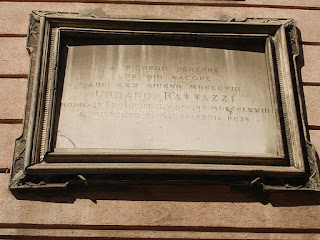NEW - Urbano Rattazzi – prime minister
Unpopular politician had anticlerical views
Urbano Pio Francesco Rattazzi, the third prime minister of the newly unified Kingdom of Italy, who is remembered for his clashes with the Italian people’s hero, Giuseppe Garibaldi, was born on this day in 1808 in Alessandria in the region of Piedmont. Rattazzi became prime minister in 1862, succeeding Bettino Ricasoli, and he held the office for nine months until his behaviour towards Garibaldi led to him being driven from office. He served as prime minister again in 1867 from April to October, but was forced by King Victor Emmanuel II to resign again because of the Italian people’s reaction to his treatment of Garibaldi. Rattazzi was married to the French novelist, Laetitia Marie Wyse Bonaparte, who was the great niece of the Emperor Napoleon I, and they had one daughter, Romana, who was born in 1871. Read more…
______________________________________
Allegra Versace – heiress
‘Favourite niece’ who inherited Gianni fortune
The heiress Allegra Versace, owner of half the Versace fashion empire, was born on this day in 1986 in Milan. The daughter of Donatella Versace, the company’s chief designer and vice-president, she was the favourite niece of Gianni Versace, who founded the fashion house in 1978. When Gianni was shot dead outside his mansion in Miami in July 1997, Allegra was just 11 years old but could look forward to becoming immensely rich after it was announced that her uncle had willed his share of the business, amounting to 50 per cent, to her when she reached her 18th birthday. By the most recent valuation of the Versace group, this means Allegra has a personal fortune worth $800 million. The remainder of the empire is owned by her mother, who has 20 per cent, and Gianni’s older brother, Santo Versace, who has 30 per cent. Yet the promise of wealth and privilege did not bring her happiness. Read more...
_______________________________________
Mario Carotenuto - actor
Roman from theatrical family made more than 100 films
The actor Mario Carotenuto, who became one of the most familiar faces in the commedia all’italiana genre of Italian film, was born on this day in 1916 in Rome. Carotenuto, who was active in the movie industry for more than 30 years having started in the theatre and on radio, played alongside some of the greats of Italian cinema, including Totò, Alberto Sordi, Vittorio De Sica, Sophia Loren and Monica Vitti. More often than not, he was cast in supporting roles rather than as the star, yet became respected as one of Italy’s finest character actors in comedy, winning a Nastro d'argento award for Best Supporting Actor for his portrayal of The Professor in Luigi Comencini’s 1973 comedy-drama Lo scopone scientifico - The Scientific Card Player - which starred Sordi, Silvana Mangano and the American Bette Davis. Carotenuto was born into an acting family. Read more...
Gianrico Carofiglio - novelist
Ex anti-Mafia judge now bestselling author
The novelist Gianrico Carofiglio, whose books have sold more than five million copies, was born on this day in 1961 in Bari. Carofiglio is best known for a series of thrillers featuring the character of lawyer Guido Guerrieri but he has also written a number of novels featuring other characters, still mainly in the crime thriller genre. One of them, his 2004 novel Il passato è una terra straniera (The Past is a Foreign Country), was made into an acclaimed film, directed by Daniele Vicari and starring Elio Germano, who appeared in the multi award-winning TV series Romanzo Criminale, and Michele Riondino, who played Andrea Camilleri’s most famous detective in the TV series The Young Montalbano. Carofiglio drew inspiration and much technical knowledge from his career as a magistrate. Read more…
________________________________________
First Martyrs' Day
Nero blamed Christians for his own crimes
Christians martyred in Rome during the reign of Nero in AD 64 are remembered every year on this day in Italy. The Catholic Church celebrates the lives of the many men and women put to death by Nero, who are now known as i Primi Martiri, first martyrs of the Church of Rome, with a feast day every year on 30 June. In the summer of AD 64, Rome was devastated by fire. The unpopular emperor Nero, who wanted to enlarge his palace, was suspected of setting fire to the city himself but he accused the early Christians then living in Rome and had them executed. Some were fed to wild animals, some crucified, while others were burnt to death to illuminate the sky and provide evening entertainment. The feast of the First Martyrs came into the Church calendar in 1969 as a general celebration day for the early Roman martyrs. Read more…
______________________________________
Book of the Day: Garibaldi: Hero of Italian Unification, by Christopher Hibbert
Giuseppe Garibaldi was praised for his military genius, his courage, and his charisma. Known as the "Hero of Two Worlds," Garibaldi's military prowess extended to the Americas, where he played a major role in the Brazilian struggle for independence. During his fight for Italian unification Garibaldi personally led an army of local untrained rebels to victory in Palermo, Naples, and Sicily. His forces suffered from lack of equipment, food, and money, and yet Garibaldi commanded their fierce loyalty. In Garibaldi: Hero of Italian Unification, Christopher Hibbert reveals how this iconic figure earned the adulation of not only his fellow Italians, but people across the globe. As well as presenting a vivid account of Garibaldi's successes and misfortunes, the book paints a picture of his personality which, though never unsympathetic, is notable for its realism and candour.Christopher Hibbert, a Fellow of the Royal Society of Literature and one of the most widely read historians of his time, wrote many highly acclaimed books, including biographies of Disraeli, Edward VII and George VI, The Rise and Fall of the House of Medici, and Cavaliers and Roundheads.


.jpg)






_-_Exterior.jpg)

.jpg)
%20(2).jpg)







